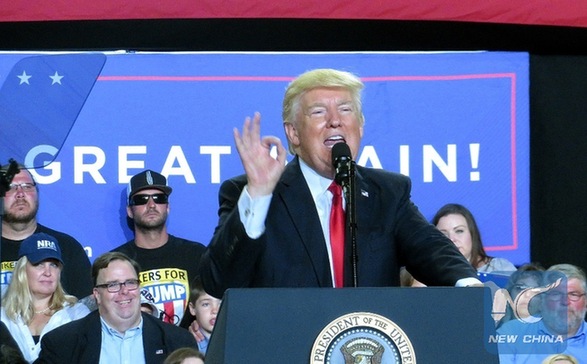What's the deal with US foreign policy lately?
- By Mitchell Blatt
 0 Comment(s)
0 Comment(s) Print
Print E-mail China.org.cn, May 2, 2017
E-mail China.org.cn, May 2, 2017
|
|
|
U.S. President Donald Trump (Front) delivers a speech during a rally marking his first 100 days in office in Harrisburg, Pennsylvania, the United States, April 29, 2017. [Photo/Xinhua] |
The late President Richard Nixon thought that if his adversaries believed he was crazy, they would be scared of what he might do and so be more willing to let the U.S. get its way. Nixon attempted to apply that strategy to relations with North Vietnam and the Soviet Union, for example.
Now, almost 50 years later, Donald Trump is all over the map on a range of issues. He vowed to keep the U.S. out of Syria before striking a Syrian government airbase. He affirmed his support for NATO after having questioned the continued use of NATO in the harshest terms. Most attention-grabbing, however, were the statements about North Korea.
While the erratic leader of that impoverished dynastic state threatened to test fire ballistic missiles or even conduct new nuclear tests in the days preceding a series of national celebrations, American officials raised the stakes, implying they might take preemptive action against North Korea. There were fears, intentionally fanned by the Trump administration, that the U.S. might shoot the missile out of the air, strike it on the launch pad, or otherwise attack targets in North Korea.
In order to back up its threats, Trump indicated that his administration had diverted an aircraft carrier, the USS Carl Vinson, from its planned course to waters off the Korean Peninsula ahead of the birth of the present leader's grandfather, Kim Il-sung. "We are sending an armada," with ships "far more powerful than the aircraft carrier."
The North Korean missile test went without any U.S. action. In fact, the missile blew up in mid-air just seconds after being fired.
Then, two days later, the Navy published photos of the USS Carl Vinson south of Singapore. This has been one of the examples cited to build the case that Trump is being "unpredictable."
Unpredictable, maybe, but threatening? Something that is going to make North Korea and America's other adversaries and enemies unable to sleep at night? Hardly.
Trump's lies about the "armada" only dampen U.S. credibility and make the next American threat less likely to be taken seriously. The world has seen that the U.S. saying there is a ship in position to strike doesn't mean this is fact. What happens when next time Trump tries to warn North Korea about the potential actions he might take? Kim Jong-un might think Trump is lying again.
At the same time, these actions by the Trump administration have already damaged its relationship with South Korea and its other allies less than 100 days into office. If the announcements about the dispatch of the aircraft carrier were meant to reassure South Korea it had American backing, the non-arrival of the carrier raised questions about its commitment.
Trump was even criticized by South Korea's conservative presidential candidate Hong Joon-pyo, who said, "If that was a lie, then during Trump's term, South Korea will not trust anything Trump says."
The madman theory was meant to be played by a rational leader in pursuit of known goals, to dissuade the other side from infringing them. Ultimately Nixon's policy didn't work out as he envisioned, because his adversaries knew he was actually rational. Trump, by not making his goals known and by undercutting the credibility of his own threats, is mad, but not a madman.
No, Trump brings another foreign policy idea to mind: the "big stick diplomacy" of President Theodore Roosevelt. The phrase, "Speak softly, and carry a big stick," described his policy of amassing ships and troops in and around South America in order to pursue American interests while at the same time prioritizing negotiations.
Trump's foreign policy, thus far, has been the opposite of Roosevelt's. His is more like shouting incoherent hyperbole while leaving your stick 3,500 miles away in the sea.
Mitchell Blatt is a columnist with China.org.cn. For more information please visit:
http://www.china.org.cn/opinion/MitchellBlatt.htm
Opinion articles reflect the views of their authors, not necessarily those of China.org.cn.







Go to Forum >>0 Comment(s)